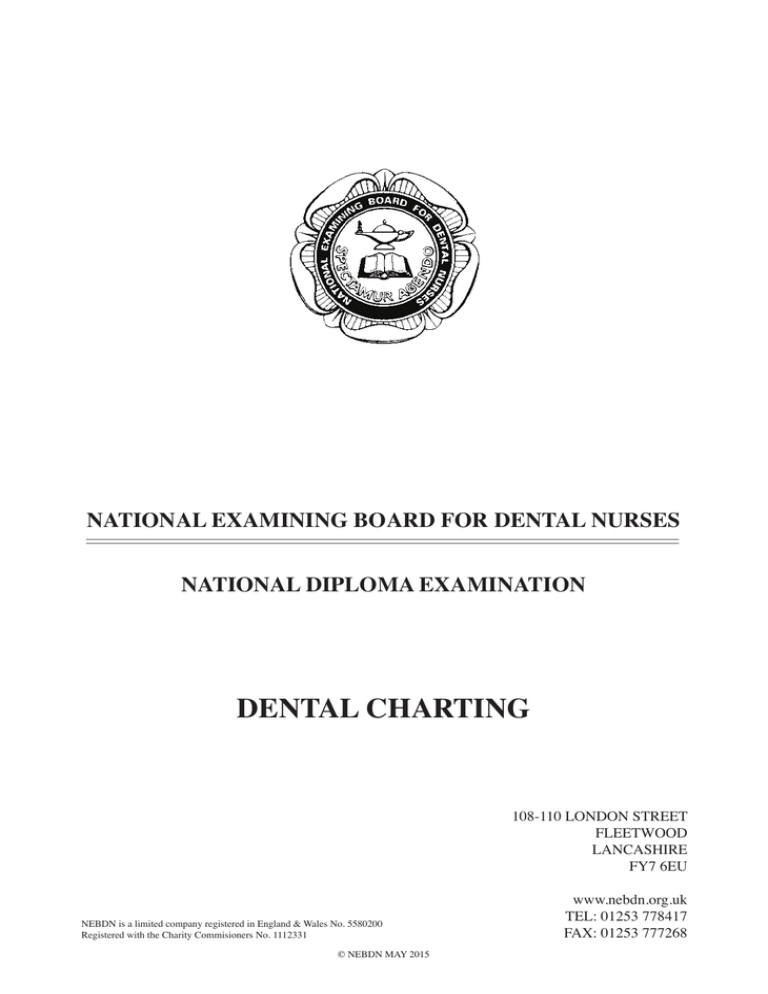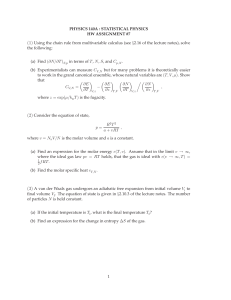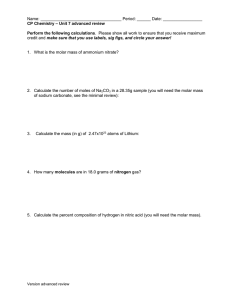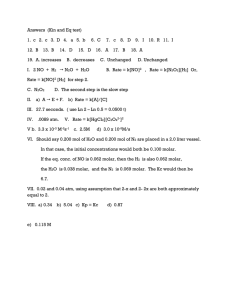dental charting - National Examining Board for Dental Nurses
advertisement

NATIONAL EXAMINING BOARD FOR DENTAL NURSES NATIONAL DIPLOMA EXAMINATION DENTAL CHARTING 108-110 LONDON STREET FLEETWOOD LANCASHIRE FY7 6EU NEBDN is a limited company registered in England & Wales No. 5580200 Registered with the Charity Commisioners No. 1112331 © NEBDN MAY 2015 www.nebdn.org.uk TEL: 01253 778417 FAX: 01253 777268 NATIONAL EXAMINING BOARD FOR DENTAL NURSES DENTAL CHARTING Dental charting is an essential element of the role of the Dental Nurse. NEBDN acknowledges that there are a number of systems and software used to record charting. It also recognises that there are local and regional differences in registering patient details. The following notations are to be used when completing or interpreting a written chart for the National Diploma Examination. A chart is a diagrammatic representation of the teeth showing all the surfaces of the teeth. The charts in the examination will be used to show: • Teeth present • Teeth missing • Work to be carried out • Work completed • Surfaces with cavities and restorations etc. When charting, the mouth is looked on as being a flat line. The diagram is viewed, as you would examine the patient’s mouth. Zsigmondy-Palmer Notation R R 8 7 6 5 4 3 2 1 1 2 3 4 5 6 7 8 8 7 6 5 4 3 2 1 1 2 3 4 5 6 7 8 L e d c b a a b c d e e d c b a a b c d e L 1 Forensic Notation Most charts have an inner and outer grid. NEBDN has introduced a new grid, which will make clear the work that has been completed in the mouth and the work which needs to be done. An example of the grid is given below. Work to be carried out Present Dental Status and work completed Work to be carried out UL Present Dental Status and work completed Present Dental Status and work completed UR Present Dental Status and work completed Work to be carried out LL Work to be carried out LR The inner grid is for present dental status and work already present in the mouth. The outer grid is for work to be carried out. 2 TOOTH SURFACES In order to complete the chart accurately candidates should be able to identify and note the correct surfaces of teeth. These are: DEFINITIONS Incisal the biting edge of the incisors and canines Occlusal the biting surfaces of premolars and molars Mesial the surface of any tooth nearest to the mid-line of the arch Distal the surface of any tooth furthest from the mid-line of the arch Buccal the surface facing the cheeks (molars and premolars) Labial the surface facing the lips (incisors and canines) Palatal the surface facing the palate of all upper teeth Lingual the surface facing the tongue of all lower teeth Cervical the part of the tooth next to the gingival margin Upper right Midline Upper left Lower right Midline Lower left Mesial Direction Distal Direction 3 ACCEPTED NOTATIONS Incisor Teeth 4 ACCEPTED NOTATIONS Premolar and Molar Teeth 5 ACCEPTED NOTATIONS Premolar and Molar Teeth 6 Example of Zsigmondy-Palmer Notation a. Upper right second molar has a mesio-occlusal cavity b. Upper right first molar has a disto-occlusal temporary dressing c. Upper right first premolar is for extraction d. Upper right canine has a buccal restoration e. Upper right central incisor is an abutment for a cantilever resin retained (Maryland) bridge f. Upper left central incisor is a resin retained (Maryland) bridge pontic g. Upper left lateral incisor has a fracture on the incisal edge which requires treatment h. Upper left second premolar needs a root filling i. Upper left second molar has preventive resin restoration (PRR) occlusally j. Upper left third molar has a fissure sealant restoration k. Lower left third molar has been recently extracted l. Lower left first molar has a lingual restoration to be replaced m. Lower left first premolar has a bonded porcelain crown n. Lower right lateral incisor has a mesial restoration and a separate distal cavity o. Lower right first premolar is missing p. Lower right second premolar has rotated mesially q. Lower right first molar has an MOD porcelain inlay r. Lower right second molar has a full restoration gold crown s. Lower right third molar is partially erupted UR UL LR LL 7 FEDERATION DENTAIRE INTERNATIONAL NOTATION (FDI) TWO DIGIT CHARTING SYSTEM In this system the quadrant symbol is replaced by a number. The quadrant number is the first digit while the second number identifies the individual tooth. Permanent dentition 1 for upper right 2 for upper left 3 for lower left 4 for lower right 18 17 16 15 14 13 12 11 21 22 23 24 25 26 27 28 48 47 46 45 44 43 42 41 31 32 33 34 35 36 37 38 Deciduous dentition 5 for upper right 6 for upper left 7 for lower left 8 for lower right 55 54 53 52 51 61 62 63 64 65 85 84 83 82 81 71 72 73 74 75 8 Example of FDI Notation a. 18 is partially erupted b. 17 has an occlusal restoration c. 16 has an occluso-palatal filling d. 14 is missing and the gap has closed e. 13 has a porcelain jacket crown in place f. 12 has a fracture of the incisal edge which requires treatment g. 21 needs distal and palatal restorations h. 24 is root filled with an occlusal restoration i. 25 has a mesial-occlusal restoration present j. 26 to be extracted k. 28 is unerupted l. 38 is missing m. 37 has an occlusal cavity n. 34 has a full gold crown o. 32 has a distal and labial restorations p. 41 has mesial and lingual cavities q. 44 has a mesial-occulsal-buccal cavity r. 48 has been recently extracted UR UL LR LL 9 Basic Periodontal Examination (BPE) This index (formerly known as the CPITN) is measured using the WHO (BPE) probe. The probe is introduced into the gingival sulcus and a light probing pressure is used around the buccal and then lingual/palatal surfaces. The mouth is divided into sextant (no 8’s) represented by a single box chart for each sextant. 13 - 23 43 - 33 17 - 14 47 - 44 24 - 27 34 - 37 For each sextant only the highest score is recorded eg: 0<1<2<3<4 BPE Code Criteria 0 Healthy periodontal tissues No bleeding after gentle probing 1 Bleeding after gentle probing Black band remains completely visible (probing depth up to 3.5mm) No calculus or defective margins detected 2 Black band remains completely visible (probing depth up to 3.5mm) Calculus or other plaque retention factor detected 3 Black band partially visible in deepest pocket (shallow pocket up to 5mm) 4 Black band not visible in pocket (deep pocket of more than 5.5mm) * Furcation involvement Example: 3 3 1 1 2 4* www.bsperio.org.uk 10 PERIODONTAL DIAGNOSIS AND TREATMENT PLAN 2mm BUCCAL L R DATE RECESSION POCKET DEPTH MOBILITY 2mm PALATAL R L R L DATE RECESSION POCKET DEPTH LINGUAL DATE 2mm RECESSION POCKET DEPTH BUCCAL L R DATE 2mm RECESSION POCKET DEPTH MOBILITY 11 ERUPTION DATES Deciduous Dentition Letter Upper eruption date months Lower eruption date months Central incisor A 10 8 Lateral incisor B 11 13 Canine C 19 20 First molar D 16 16 Second molar E 29 27 Letter Upper eruption date years Lower eruption date years Central incisor 1 7 to 8 6 to 7 Lateral incisor 2 8 to 9 7 to 8 Canine 3 10 to 12 9 to 10 First premolar 4 9 to 11 9 to 11 Second premolar 5 10 to 11 9 to 11 First molar 6 6 to 7 6 to 7 Second molar 7 12 to 13 11 to 12 Third molar 8 18 to 25 18 to 25 Tooth Permanent Dentition Tooth 12


